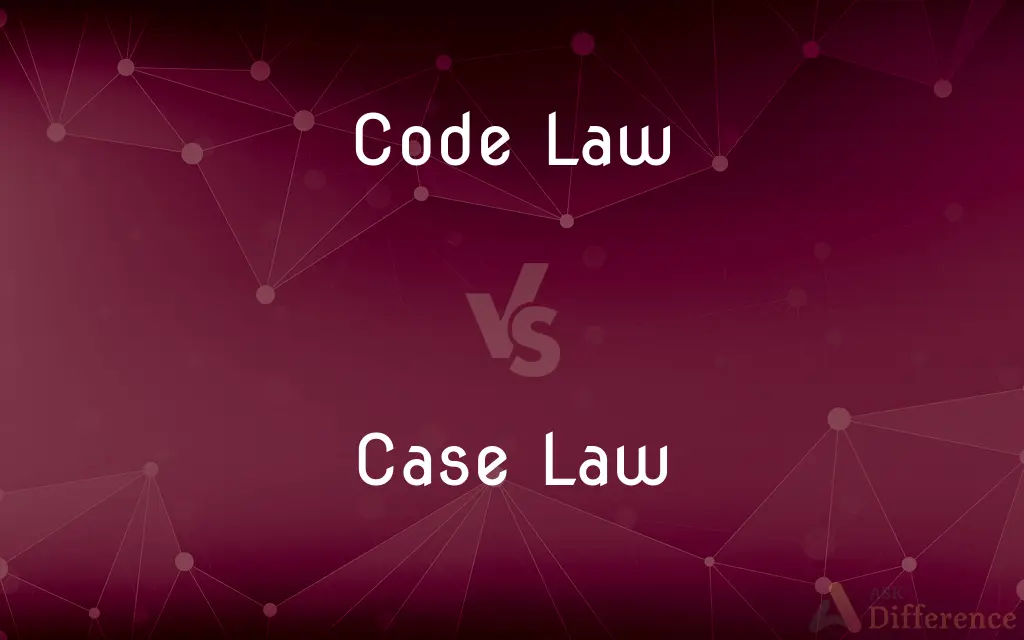Code Law vs. Case Law — What's the Difference?
By Tayyaba Rehman — Published on November 29, 2023
Code Law is a system based on written legal codes, while Case Law derives from judicial decisions and precedent.

Difference Between Code Law and Case Law
Table of Contents
ADVERTISEMENT
Key Differences
Code Law, often synonymous with civil law, is a system where the primary source of legal authority is written statutes or codes. These codes are comprehensive and cover various aspects of society, providing explicit details about how the law should be applied. Case Law, on the other hand, is rooted in the common law system. Here, the primary source of law is not written statutes but rather the decisions made by judges in specific cases.
In countries dominated by Code Law, legislators play a crucial role. They outline the entirety of the law in codified form. Everything from contracts to family law is detailed in these codes. Conversely, in Case Law jurisdictions, while statutes do exist, they are not as exhaustive. Instead, it's the responsibility of the judges to interpret statutes and fill in the gaps, drawing from previous cases to ensure consistent application.
When someone references Code Law, they often point to the written and organized legal codes that offer clear and detailed rules for all areas of law. It is a top-down approach, where the law is dictated by legislators. In comparison, Case Law operates bottom-up, emerging from individual cases and evolving over time. Judges examine the intricacies of each case and, in doing so, create precedents that future cases can refer to.
The predictability of Code Law arises from its codified nature. If you want to know the law, you look at the legal code. This contrasts with Case Law, where legal outcomes might vary based on how judges interpret statutes and previous decisions. Here, past judicial decisions are crucial, and legal professionals often rely on the doctrine of stare decisis, meaning "to stand by things decided," emphasizing the importance of adhering to established precedent.
The distinction between Code Law and Case Law illustrates two fundamental approaches to legal systems. While Code Law is definitive and detailed in its written codes, Case Law is dynamic, evolving with each new judicial decision.
ADVERTISEMENT
Comparison Chart
Source of Authority
Written statutes or codes
Judicial decisions
Role of Judges
Interpretation of codes
Creation and interpretation of precedents
Predictability
High (based on detailed codes)
Varies (based on previous decisions)
Evolution
Changes through legislative amendments
Evolves with each new judicial decision
Geographic Dominance
Common in continental Europe
Predominant in the UK and US
Compare with Definitions
Code Law
A legal system rooted in written statutes.
In France, the Code Law system is embodied in the Napoleonic Code.
Case Law
A bottom-up approach to lawmaking.
In Case Law systems, individual court decisions can have wide-ranging implications.
Code Law
Comprehensive and detailed legal rules.
The German Civil Code is an example of the exhaustive nature of Code Law.
Case Law
Rooted in the common law system.
Case Law is instrumental in shaping legal outcomes in the United States.
Code Law
A top-down approach to lawmaking.
In Code Law jurisdictions, legislators play a pivotal role in shaping the legal landscape.
Case Law
Evolves through precedent and interpretation.
Over time, Case Law can change as societal values shift.
Code Law
Prioritizes clarity and specificity.
With Code Law, the emphasis is on clear and specific legal provisions.
Case Law
Law established by judicial decisions.
The Roe v. Wade decision is a significant piece of American Case Law.
Code Law
Law dictated by legislative bodies.
Code Law ensures that legal rules are accessible in codified documents.
Case Law
Relies on the doctrine of stare decisis.
The principle of stare decisis ensures consistency in Case Law.
Common Curiosities
Is Case Law exclusive to the U.S.?
No, Case Law or common law systems are prevalent in many countries, especially former British colonies.
Which countries predominantly follow Code Law?
Many continental European countries, like France and Germany, follow Code Law.
How does Case Law evolve?
Case Law evolves through judicial decisions and established precedents.
Do Case Law systems lack written statutes?
No, they have written statutes, but these are often less exhaustive than in Code Law systems.
Are judges in Code Law systems restricted to the written code?
While they base decisions on the code, they interpret its application in specific circumstances.
Which system offers more legal predictability?
Code Law generally offers more predictability due to its detailed codes.
What is the primary source of authority in Code Law?
Code Law derives its authority from written statutes or codes.
How are changes made in Code Law?
Changes in Code Law are typically made through legislative amendments.
Why is precedent important in Case Law?
Precedent ensures consistency and predictability in judicial decisions.
Can Case Law override statutes?
In some jurisdictions, especially where judicial review exists, Case Law can effectively override or interpret statutes.
Is the U.S. legal system based on Case Law?
Yes, the U.S. predominantly follows a Case Law system, though statutes and codes also play a significant role.
Can a single case influence the entire legal system in Case Law jurisdictions?
Yes, landmark decisions can shape the interpretation of law for years to come.
Share Your Discovery

Previous Comparison
Time Series vs. Cross Sectional Data
Next Comparison
Are vs. WereAuthor Spotlight
Written by
Tayyaba RehmanTayyaba Rehman is a distinguished writer, currently serving as a primary contributor to askdifference.com. As a researcher in semantics and etymology, Tayyaba's passion for the complexity of languages and their distinctions has found a perfect home on the platform. Tayyaba delves into the intricacies of language, distinguishing between commonly confused words and phrases, thereby providing clarity for readers worldwide.
















































